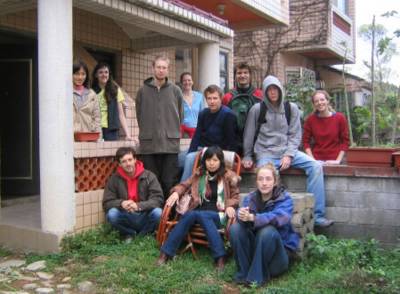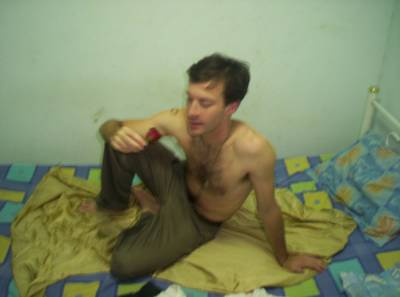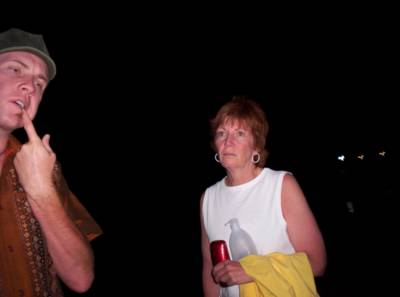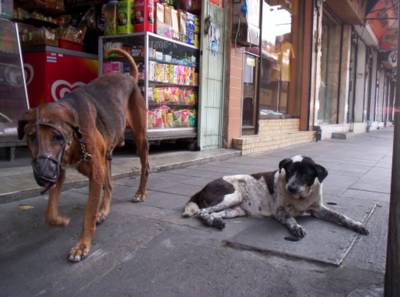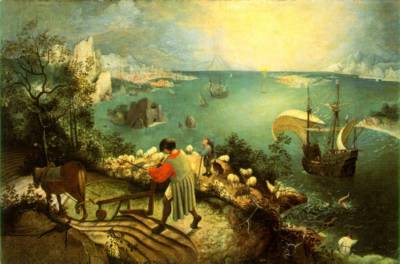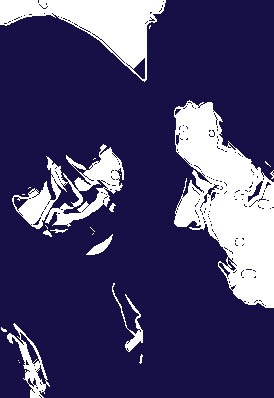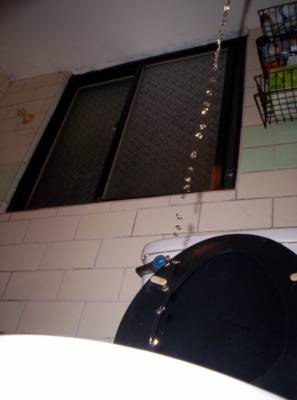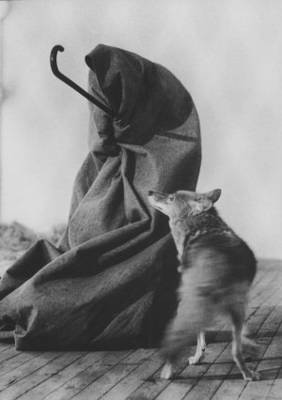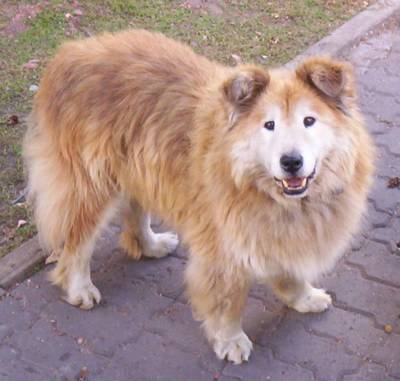
Thursday, December 30, 2004
Reflections On Subversive and Malignant Behavior Which Further Reflects Subversive and Malignant Behavior

Wednesday, December 29, 2004
Tuesday, December 28, 2004

For the Sake of the Song
by Townes Van Zandt
Why does she sing her sad songs for me, I'm not the one
To tenderly bring her soft sympathy, I've just begun
To see my way clear and it's plain if I stop I will fall
I can lay down a tear for her pain, just a tear and that's all
What does she want me to do
She says that she knows that moments are rare
I suppose that it's true
Then on she goes to say I don't care and she knows that I do
Maybe she just has to sing for the sake of the song
Who do I think that I am to decide that she's wrong
She'd like to think that I'm cruel but she knows that's a lie for I would be
No more than a tool if I allowed her to cry all over me
My sorrow is real even though I can't change my plans
If she could see how I feel then I know that she'd understand
Does she actually think I'm to blame
Does she really believe that some word of mine
Could relieve all her pain
Can't she see that she grieves just because she's been blindly deceived
By her shame
Maybe she just has to sing for the sake of the song
Who do I think that I am to decide that she's wrong
Nothin's what it seems, maybe she'll start someday to realize
If she abandons her dreams then all the words she can say are only lies
When will she see that to gain is only to lose
All that she offers me are her chains, I got to refuse
It's only to herself that she's lied
She likes to pretend there's something that she should defend with her pride
I don't intend to stand her and be the friend from whom she must hide
Maybe she just has to sing for the sake of the song
Who do I think that I am to decide that she's wrong

Monday, December 27, 2004
A seemingly unreasonable suicide (with/and nameless invisible characters)
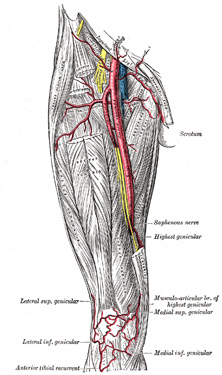
He walked to his car and fumbled about, his keys were lost again. The time had come for a sharp remedy. He walked back into the house and fished a knife from out of the sink half-full with rinse water. He flicked the excess water from the knife and lowered the blade to his inner thigh, up high, inner thigh. With a fast push and slow stiff pull he sliced open his pants and his skin. The blood first raged and then meow-shyly wondered out. His fading leg no longer hurt and he would never forget or remember anything again.
His wife came home a bit late and found him there in a dark pool of cold blood. She found the site revolting. As such she ran out from the house and started to cry. Mm, she lost her wits. She walked up and down the road awhile and the sun began to set. She fell to the curb and felt her husband walking behind her, bending beside her and putting his hands on her warm open back, comforting her. She jerked forward, leaning heavily towards her knees and the pavement, folding her back in-half, away from his touch, still angry that he would be dead to her.
A living neighbor saw her on the curb and he called out to her; she did not respond and was obviously upset. The neighbor went back into his house and asked his wife to find out what was wrong. His wife found out and she told him to *"“call the ambulance!"” She also insisted that he go over to the neighbor’'s house and check on the man-- just in case. The grieving woman stopped crying and began to repeatedly bob. The neighbor's wife held a glass of inadvertently warm tap water—---for the bewildered hunk at her feet to drink.
Instead the neighbor reached for the glass of water from his wife'’s fat hand and drank half of it down in childlike, concentrated, swallows. Some lines of it ran out from the corners of his mouth and met again under his chin. Drip drop. He told his wife that the water was warm. He exhaled a bunch and walked to the dead man'’s door. When he inhaled, the air went in little by little-- semi-audible shots, each time sputtering thinner and faster near the end . He was bothered by the idea of seeing a dead man. Also he still had not known the means by which, or even if, the dead man was dead. He thought it was a fairly dangerous idea; perhaps the man was not dead and was just waiting to kill somebody before he actually would kill himself; one of those ‘murder-suicides!’ Maybe there was a mad-man on the loose. A killing! A killer! On the loose! He grimaced hard and blew even harder from his nose, and with that he felt suddenly brave, brave like in his tough-riggin’ days, fighting anybody and lots of girls-- and he walked right into his neighbor’s house and twice called out his neighbor’s name. Even though the dead man’'s name was one syllable alone the neighbor said it using two definite syllables: __-____? ___-____? Silence. The dead man did not answer and this relieved the inspecting neighbor . This unanswered title meant the dead man was truly dead. True enough. The nighbor walked into the kitchen and saw his dead acquaintance on the floor; on the floor, in blood. He was surprised by how much blood his dead neighbor was laying in. He thought about checking the pulse of the dead man but he really didn’t want to. What if suddenly the house doors shut and the wind howled and a baby screamed and the dead man’'s head bolted up and tried to bite him? No, he didn’t want to check the dead man'’s pulse. As he made his way from out of the house he worried that somebody below the stairs or under the bed was going to swipe his legs out from under him and drag him back to somewhere much like Hell, even though he was not walking on any stairs or near any beds. He had his fore-arms up high, pressed to his sides. He walked fast then faster and kept his crooked arms way up as he was terribly afraid. Outside the ambulance was sounding and he was grateful to be outside. He walked over to his wife and told her not to go back to the dead neighbor'’s house. She thought his suggestion was untimely and queer. She thought her husband looked tired. The wife of the dead husband heard nothing and wobbled her head about; she was groggy and retarded by grief-- the shock.
Before the paramedics arrived the police came. The police were singularly represented by one police man. The police man talked to the scared neighbor who informed him not to go into the house because the neighbor was already dead, but most importantly just not to go into the house. The police man recognized the neighbor'’s fear but considered going into the house “part of the job” and so without hesitation he walked towards the house. By this time more neighbor's were creeping out of their houses and onto the street and the sun had fully set. The moon was rising. The clean children played with the dirty children on the excited, festive street. The clean kids with knowing parents had freshly washed hair that was still wet and combed; parted to the side-- they wore pajamas. The poor kids were skinny and dirty and had ugly parents; they were still in their swimsuits and bounced on hardened bare-feet. The police man walked towards the house and paused for a moment, he then looked back at the crowd and pointed (hand shaped like a pistol) to the door and back to the crowd as if to say, “"This the house? This the one?"” Many members of the concerned neighborhood crowd responded, nodding their heads and a few said “"Yeah"” meaning, “"Yeah, that’s the house"” or "“Yeah, that one."” The police man walked in and found the man in the kitchen. The police man had his gun out-- just in case. The police man squatted down next to the dead man and felt for a pulse. The dead man was dead and had no pulse. The policeman was left-handed and looked at the knife lying on the left-hand side of the dead man’s body and thought, “"I bet he’'s left-handed'" and he felt pretty good about making such a sleuthy deduction. The police man pressed his index finger and middle finger on his dominant hand together and he touched the pool of blood. For a minute it seemed as though he was going to taste it, maybe even rub it on his gums to see if it was pure-cocaine---an old cop-trick, see. The blood stuck to his fingers and the coating was shiny and a thick red. The police man stood up and splashed his blood-laden hand around in the sink still half-full with rinse water. The police man used his radio. It was nearing 8 o’clock and the evening air was hot. The radio sounded back to the police man, it was another police man giving him procedural advice or perhaps telling him what to do without being too pushy.
...
* as opposed to "call an ambulance!"

Thursday, December 23, 2004
thai.doc
Wednesday, December 01, 2004
Final Words of Flight 261
This is an excerpt taken from the official NTSB transcript of Flight 261, which crashed on January 31, 2000, off the coast of California. This excerpt contains an exchange between Captain Ted Thompson and First Officer William Tansky and the Los Angeles Route Traffic Control Center (LAX-CTR).
| 4:09:55 p.m. | Thompson: Center, Alaska two-sixty-one. We are, uh, in a dive here, and I've lost control, vertical pitch. |
| 4:10:33 | Thompson: Yea, we got it back under control here. |
| 4:11:43 | Tansky: Whatever we did is no good. Don't do that again... |
| 4:11:44 | Thompson: Yea, no, it went down. It went full nose down. |
| 4:11:48 | Tansky: Uh, it's a lot worse than it was? |
| 4:11:50 | Thompson: Yea. Yea. We're in much worse shape now. |
| 4:14:12 | Public address: Folks, we have had a flight-control problem up front here, we're working on it. |
| 4:15:19 | Flight 261 to LAX-CTR: L.A., Alaska two-sixty-one. We're with you, we're at twenty-two-five [22,500 feet]. We have a jammed stabilizer and we're maintaining altitude with difficulty... |
| 4:15:36 | LAX-CTR: Alaska two-sixty-one, L.A center. Roger, um, you're cleared to Los Angeles Airport via present position... |
| 4:17:09 | Flight attendant: Okay, we had like a big bang back there. |
| 4:17:15 | Thompson: I think the [stabilizer] trim is broke. |
| 4:19:36 | Extremely loud noise |
| 4:19:43 | Tansky: Mayday |
| 4:19:54 | Thompson: Okay, we are inverted, and now we gotta get it. |
| 4:20:04 | Thompson: Push, push, push...push the blue side up. Push... |
| 4:20:14 | Tansky: I'm pushing. |
| 4:20:16 | Thompson: Okay, now let's kick rudder. Left rudder, left rudder. |
| 4:20:18 | Tansky: I can't reach it. |
| 4:20:20 | Thompson: Okay. Right rudder, right rudder. |
| 4:20:25 | Thompson: Are we flying? We're flying, we're flying. Tell 'em what we're doing. |
| 4:20:33 | Tansky: Oh, yeah. Let me get... |
| 4:20:38 | Thompson: Gotta get it over again. At least upside down we're flying. |
| 4:20:54 | Thompson: Speedbrakes |
| 4:20:55 | Tansky: Got it. |
| 4:20:56 | Thompson: Ah, here we go. |
| 4:20:57 | End of recording |
Click here to read the full transcript (PDF) of Flight 261.
---
rjb says: the full PDF transcript starts off slow, there is lots of shit dealing with the opening of the black box, I skipped most of that, also there may be a bit too much tech. jargon throughout but you can feel most of it, the gist--but besides that it reads like a thriller, which, I guess it genuinely is. By reading it I sickened myself. The pilots tried buddies. I maybe have just wrecked the ending by posting it above, but fuck, it's not like anyone besides myself would actually attempt the full transcript.
I hate flying (the dying).
Monday, November 29, 2004
The Cut-Up Method of Brion Gysin
In the summer of 1959 Brion Gysin painter and writer cut newspaper articles into sections and rearranged the sections at random. Minutes to Go resulted from this initial cut-up experiment. Minutes to Go contains unedited unchanged cut ups emerging as quite coherent and meaningful prose. The cut-up method brings to writers the collage, which has been used by painters for fifty years. And used by the moving and still camera. In fact all street shots from movie or still cameras are by the unpredictable factors of passers by and juxtaposition cut-ups. And photographers will tell you that often their best shots are accidents . . . writers will tell you the same. The best writing seems to be done almost by accident but writers until the cut-up method was made explicitó all writing is in fact cut ups. I will return to this pointóhad no way to produce the accident of spontaneity. You can not will spontaneity. But you can introduce the unpredictable spontaneous factor with a pair of scissors.
The method is simple. Here is one way to do it. Take a page. Like this page. Now cut down the middle and cross the middle. You have four sections: 1 2 3 4 . . . one two three four. Now rearrange the sections placing section four with section one and section two with section three. And you have a new page. Sometimes it says much the same thing. Sometimes something quite differentócutting up political speeches is an interesting exerciseóin any case you will find that it says something and something quite definite. Take any poet or writer you fancy. Here, say, or poems you have read over many times. The words have lost meaning and life through years of repetition. Now take the poem and type out selected passages. Fill a page with excerpts. Now cut the page. You have a new poem. As many poems as you like. As many Shakespeare Rimbaud poems as you like. Tristan Tzara said: ìPoetry is for everyone.î And AndrÈ Breton called him a cop and expelled him from the movement. Say it again: ìPoetry is for everyone.î Poetry is a place and it is free to all cut up Rimbaud and you are in Rimbaude is a Rimbaud poem cut up.
Visit of memories. Only your dance and your voice house. On the suburban air improbable desertions ... all harmonic pine for strife.
The great skies are open. Candor of vapor and tent spitting blood laugh and drunken penance.
Promenade of wine perfume opens slow bottle.
The great skies are open. Supreme bugle burning flesh children to mist.
Cut-ups are for everyone. Anybody can make cut ups. It is experimental in the sense of being something to do. Right here write now. Not something to talk and argue about. Greek philosophers assumed logically that an object twice as heavy as another object would fall twice as fast. It did not occur to them to push the two objects off the table and see how they fall. Cut the words and see how they fall.
Shakespeare Rimbaud live in their words. Cut the word lines and you will hear their voices. Cut-ups often come through as code messages with special meaning for the cutter. Table tapping? Perhaps. Certainly an improvement on the usual deplorable performance of contacted poets through a medium. Rimbaud announces himself, to be followed by some excruciatingly bad poetry. Cutting Rimbaud and you are assured of good poetry at least if not personal appearance.
All writing is in fact cut-ups. A collage of words read heard overhead. What else? Use of scissors renders the process explicit and subject to extension and variation. Clear classical prose can be composed entirely of rearranged cut-ups. Cutting and rearranging a page of written words introduces a new dimension into writing enabling the writer to turn images in cinematic variation. Images shift sense under the scissors smell images to sound sight to sound sound to kinesthetic. This is where Rimbaud was going with his color of vowels. And his ìsystematic derangement of the senses.î The place of mescaline hallucination: seeing colors tasting sounds smelling forms.
The cut-ups can be applied to other fields than writing. Dr Neumann in his Theory of Games and Economic Behavior introduces the cut-up method of random action into game and military strategy: assume that the worst has happened and act accordingly. If your strategy is at some point determined . . . by random factor your opponent will gain no advantage from knowing your strategy since he can not predict the move. The cut-up method could be used to advantage in processing scientific data. How many discoveries have been made by accident? We can not produce accidents to order. The cut-ups could add new dimension to films. Cut gambling scene in with a thousand gambling scenes all times and places. Cut back. Cut streets of the world. Cut and rearrange the word and image in films. There is no reason to accept a second-rate product when you can have the best. And the best is there for all. ìPoetry is for everyoneî . . .
Now here are the preceding two paragraphs cut into four sections and rearranged:
ALL WRITING IS IN FACT CUT-UPS OF GAMES AND ECONOMIC BEHAVIOR OVERHEARD? WHAT ELSE? ASSUME THAT THE WORST HAS HAPPENED EXPLICIT AND SUBJECT TO STRATEGY IS AT SOME POINT CLASSICAL PROSE. CUTTING AND REARRANGING FACTOR YOUR OPPONENT WILL GAIN INTRODUCES A NEW DIMENSION YOUR STRATEGY. HOW MANY DISCOVERIES SOUND TO KINESTHETIC? WE CAN NOW PRODUCE ACCIDENT TO HIS COLOR OF VOWELS. AND NEW DIMENSION TO FILMS CUT THE SENSES. THE PLACE OF SAND. GAMBLING SCENES ALL TIMES COLORS TASTING SOUNDS SMELL STREETS OF THE WORLD. WHEN YOU CAN HAVE THE BEST ALL: ìPOETRY IS FOR EVERYONEî DR NEUMANN IN A COLLAGE OF WORDS READ HEARD INTRODUCED THE CUT-UP SCISSORS RENDERS THE PROCESS GAME AND MILITARY STRATEGY, VARIATION CLEAR AND ACT ACCORDINGLY. IF YOU POSED ENTIRELY OF REARRANGED CUT DETERMINED BY RANDOM A PAGE OF WRITTEN WORDS NO ADVANTAGE FROM KNOWING INTO WRITER PREDICT THE MOVE. THE CUT VARIATION IMAGES SHIFT SENSE ADVANTAGE IN PROCESSING TO SOUND SIGHT TO SOUND. HAVE BEEN MADE BY ACCIDENT IS WHERE RIMBAUD WAS GOING WITH ORDER THE CUT-UPS COULD ìSYSTEMATIC DERANGEMENTî OF THE GAMBLING SCENE IN WITH A TEA HALLUCINATION: SEEING AND PLACES. CUT BACK. CUT FORMS. REARRANGE THE WORD AND IMAGE TO OTHER FIELDS THAN WRITING.
Friday, November 26, 2004
'Landscape with the Fall of Icarus' and insprirations
Landscape with the Fall of Icarus
by Brueghel, Pieter
c. 1558
Oil on canvas, mounted on wood
73.5 x 112 cm
Musees royaux des Beaux-Arts de Belgique, Brussels
-----
Landscape With The Fall Of Icarus
by William Carlos Williams
According to Brueghel
when Icarus fell
it was spring
a farmer was ploughing
his field
the whole pageantry
of the year was
awake tingling
near
the edge of the sea
concerned
with itself
sweating in the sun
that melted
the wings' wax
unsignificantly
off the coast
there was
a splash quite unnoticed
this was
Icarus drowning
---
Musée des Beaux Arts
by W. H. Auden
About suffering they were never wrong,
The Old Masters; how well, they understood
Its human position; how it takes place
While someone else is eating or opening a window or just walking dully along;
How, when the aged are reverently, passionately waiting
For the miraculous birth, there always must be
Children who did not specially want it to happen, skating
On a pond at the edge of the wood:
They never forgot
That even the dreadful martyrdom must run its course
Anyhow in a corner, some untidy spot
Where the dogs go on with their doggy life and the torturer's horse
Scratches its innocent behind on a tree.
In Breughel's Icarus, for instance: how everything turns away
Quite leisurely from the disaster; the ploughman may
Have heard the splash, the forsaken cry,
But for him it was not an important failure; the sun shone
As it had to on the white legs disappearing into the green
Water; and the expensive delicate ship that must have seen
Something amazing, a boy falling out of the sky,
had somewhere to get to and sailed calmly on.
Wednesday, November 24, 2004
More Duerer
Tuesday, November 23, 2004
Sunday, November 21, 2004
Seven Cardinal Sins
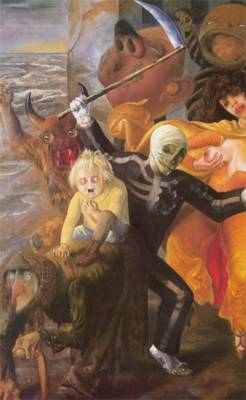
by Otto Dix
Ranked in order of severity (worst sins listed first) as per Dante's Divine Comedy (in the Purgatorio), the seven deadly sins are:
- pride (vanity) — a desire to be important or attractive to others or excessive love of self (holding self out of proper position toward God or fellows; Dante's definition was "love of self perverted to hatred and contempt for one's neighbor")
- envy (jealousy); resentment of others for their possessions (Dante: "Love of one's own good perverted to a desire to deprive other men of theirs")
- wrath (anger) — inappropriate (unrighteous) feelings of hatred, revenge or even denial, as well as punitive desires outside of justice (Dante's description was "love of justice perverted to revenge and spite")
- laziness is condemned because:
- others have to work harder
- it is disadvantageous for oneself, because useful work does not get done
- an equilibrium: one does not produce much, but one does not need much either (in Dante's theology, sloth is the "failure to love God with all one's heart, all one's mind, and all one's soul" - specific examples including laziness, cowardice, lack of imagination, complacency, and irresponsibility)
- avarice (covetousness, greed) — a desire to possess more than one has need or use for (or, according to Dante, "excessive love of money and power")
- gluttony — wasting of food, either through overindulgence in food, drink or intoxicants, misplaced desire for food for its sensuality, or withholding food from the needy ("excessive love of pleasure" was Dante's rendering)
- lust — unlawful sexual desire, such as desiring sex with a person one is not married to.; fornication (Dante's criterion was "excessive love of others," thereby detracting from the love due God). It should be noted that in some lists of the Seven Deadly Sins, lust is replaced with luxuria or luxury.
source:
http://en.wikipedia.org/wiki/Seven_deadly_sins

Thursday, November 18, 2004
b.m. interp.
There is something overly-humbling and somewhat sinister in suggesting that we are merely bundles of reflexes and learned traits as Skinner suggested, yet the more I think on it the more I’m convinced I become. Interpretation is colored by previous interpretations, just as the color of your love is always discolored by the hue of your previous loves. The essence of life is imitation and conglomeration. Still I suppose we might be able to change certain perceptions by actively interpreting interactions as objectively as we can-- but I presume most of us are too experienced for such Godlike feats.
One more thing, I can tell you that somehow my current ideas are propelling me away from my former atheist-tinged agnosticism and towards the recognition of there being an existing Deity or Creator or core source.
Sunday, November 14, 2004
Eavesdroppin' Let Down
Some might call me an eavesdropper but it’s not like I’m listening in all of the time. The truth is I’m usually focused on something else and my attention must be sucked in by a few mystifying words or an interesting bit of dialogue before any concentrated mischievousness goes down. Usually I first hear an unprocessed and muffled conversation, then the cued wonder-words, then-- then the engrossing play. This particular episode starts with a loud and excited Troy sitting in his room with Fran. Fran, sharing the room with Troy, is lying on their bed relaxing before the scheduled action-movie at 9:30 pm. An unspectacular conversation had been going on for an unknown amount of time because as I mentioned earlier I was paying no attention to it; I was merely doing my own thing in the living room---about 15 feet away from the scene. So, following the old cliché ‘I was sitting there minding my own business’, half-watching a crappy, hi-tech looking, British documentary on Killer Creatures (conniving wasps disguised as ants, malevolent jellyfish, and the like) when suddenly Troy’s deafening words focused and become clear to me, “Wait, you said I can do anything I want!” he confronted Fran. That’s all he needed to say because from that point on I was tuned into their conversation like the uncouth eavesdropper you know I am. Fran sounded groggy, perhaps her face was partially covered, “Yeah, but not that.” Troy announced “But that’s not-- you-- you’re contradicting yourself because I wanna do this one thing”. An urgent Fran replied “Yeah but not that one thing”. Troy was becoming more frenzied and with a fierce bravado explained, “Yeah, but that’s not—that’s not fair because what I really want to do is fart!”
Fuck, what a let down! I had put my moral integrity on the line to hear some lofty dramatics and instead I got a manic Troy farcically demanding his right to fart. I’d been set up. And to think that their play began so strongly.
Saturday, November 13, 2004
Go to bed. - Willamene
As I stopped, I sorta tranced out for a while.
Moments later I zoned back into the page and someone had written, "Go to bed." on the screen. I did it, I must have, but I have no memory of it. Maybe it was my gaurdian angel and witch woman "Willamene."
ettaiwan
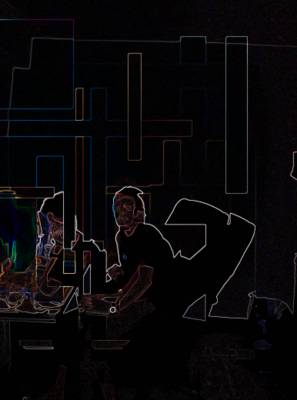
Trox is always at his computer. http://www.ettaiwan.com is dryin him out but laying the financial groundwork to a dark and glorious future.
Yes, here's a crappy photoshop job that expresses my photoshopped concern and envy. Click on it for more details.
Friday, November 12, 2004
found/seen some Albrecht Duerer

Portrait of Michael Wolgemut
by Albrecht Duerer
1516
Oil and tempera on panel
29 x 27 cm
Germanisches Nationalmuseum, Nuremberg
---
I saw some art on-line by Albrecht Duerer, I really love his stuff, his portraits especially--so rich. Says he didn't like doing portraits. It always weirds me out when really great artists dismiss their best stuff so often and praise the lackluster. I mean, I guess they should know right?
I want one of his portraits up here... I have no money. Hundreds of thousands? Millions? iich.

Sunday, November 07, 2004
have no fun the dancer
I have a hard time pretending to be having fun. Dancing to really bad drum and bass shit is especially hard for me to fake. Goos and Cheub can do it so they do. I wish I could. It looks like fun. Last night I gave it a good try but it felt wrong; wrong at a very basic level, like my soul was hurting, sneering at me for even trying it. I stopped dancing and stood in the corner drinking 175NT bottled water. Like the dunce, I watched and envied and despised. The sacrifice of dancing to all-out bullshit seems like too big a price to pay for a morsel of social glory. I used to be able to though, that’s what’s especially unsettling. I used to dance like all the gregarious yo-yos. But now I dunno if I’m too vain and insecure or what but I can’t/wont/cain’t (hard a).
Thursday, November 04, 2004
Wednesday, November 03, 2004
Mosquitoes
Friday, October 29, 2004
Bad Shower

Bad Rash

(not my arm but someone's arm and I bet it's itchy-- my arm is more spotty like measles, but the over -the-counter hydrocortisone ointment is helping a bit)

Thursday, October 28, 2004
Grizzle
I love Grizzle. He's part-Chow and part-Husky, which makes him a mutt. He was free. Most mutts are but fops and yuppies like to spend money on puppies just to say they spent the money. He's 91 or 98 years old. Recently my mom put him on some anti-inflammatories to combat his arthritis and he's been jumping the fence(something he hasn't been mobile enough to do for years) again. I'm happy that he can still roam around eating garbage and pissing over other's piss. Bruin is his son, well, adopted son and he's a fine dog as well.


